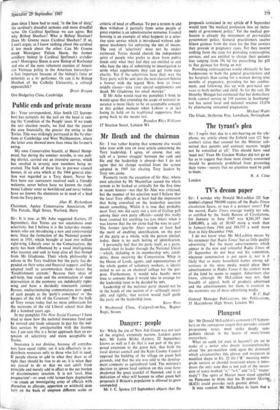Sir: It is true, as Mr Ashe suggested (Letters, 15
September), that Tories are not unanimous over selectivity, but I believe it is the latter-day means- testers who are introducing a new and controversial note. Since the formation of the National govern- ment in 1931,' which brought at least two million right-wing Liberals over to the Conservatives, the party has been influenced by a vocal intelligentsia who treasure and seek to keep alive all that flowed from Mr Gladstone. Their. whole philosophy is odious to the Tory tradition but the party has de- pended on their votes and financial support, and has adapted itself to accommodate them—hence the 'Establishment attitude.' Because their ideas of self-help, free trade and the minimisation of state intervention in the economy are indubitably right- wing and have a decidedly nineteenth century flavour, undiscriminating commentators now speak of such people as the 'party's conscience' or 'the keepers of the Ark of the Covenant.' But the bulk of Tory voters today feel no more enthusiasm for the nostrums of the old Liberal school than they did a hundred years ago.
In my pamphlet The New Social Contract I have tried to show how the national insurance fund can be revived and made adequate to pay for the wel- fare services by amalgamatIon with the income tax. I am sure this is a better approach than an ex- tension of selectivity and more acceptable to Tories.
Insurance is not divisive, because all contribu- tors have equal rights; yet it acts effectively to re- distribute resources only to those who fall in need. If people choose to add to what they draw as of right they should be free to do so; it is when they are forced to do so that we cast adrift from principle and merely add in effect to the net burden of discriminatory taxation. It is not 'cool, blue pragmatism'—or even cold laissez-faire dogmatism —to create an investigating army of officials with discretion to allocate, apportion or withhold state help on the basis of umpteen different scales or criteria of need or affluence. To put a system in and then withdraw it partially from some people at great expense is an administrative nonsense. Council housing is an example of what happens to a selec- tive state service which is introduced without ade- quate machinery for enforcing the test of means. The cost of 'selectivity' must not be under- estimated. Tories should cherish the independent spirit of people who prefer to draw from public funds only what they feel they are entitled to and who hate the idea of submitting to investigation to settle what supplements they can get from state charity. Yet if the selectivists have their way the Tory party will be sent into the next election behind a banner with the legend 'Bow, bow ye lower middle classes—take your special supplements and thank Mr Gladstone for small mercies.'
If Mr Ashe would read my pamphlet I think he would agree that extending the scope of national in- surance is more likely to be an acceptable concept, at this golden moment when Labour is at last losing its hold on its traditional supporters, than going back to the means test.






































 Previous page
Previous page